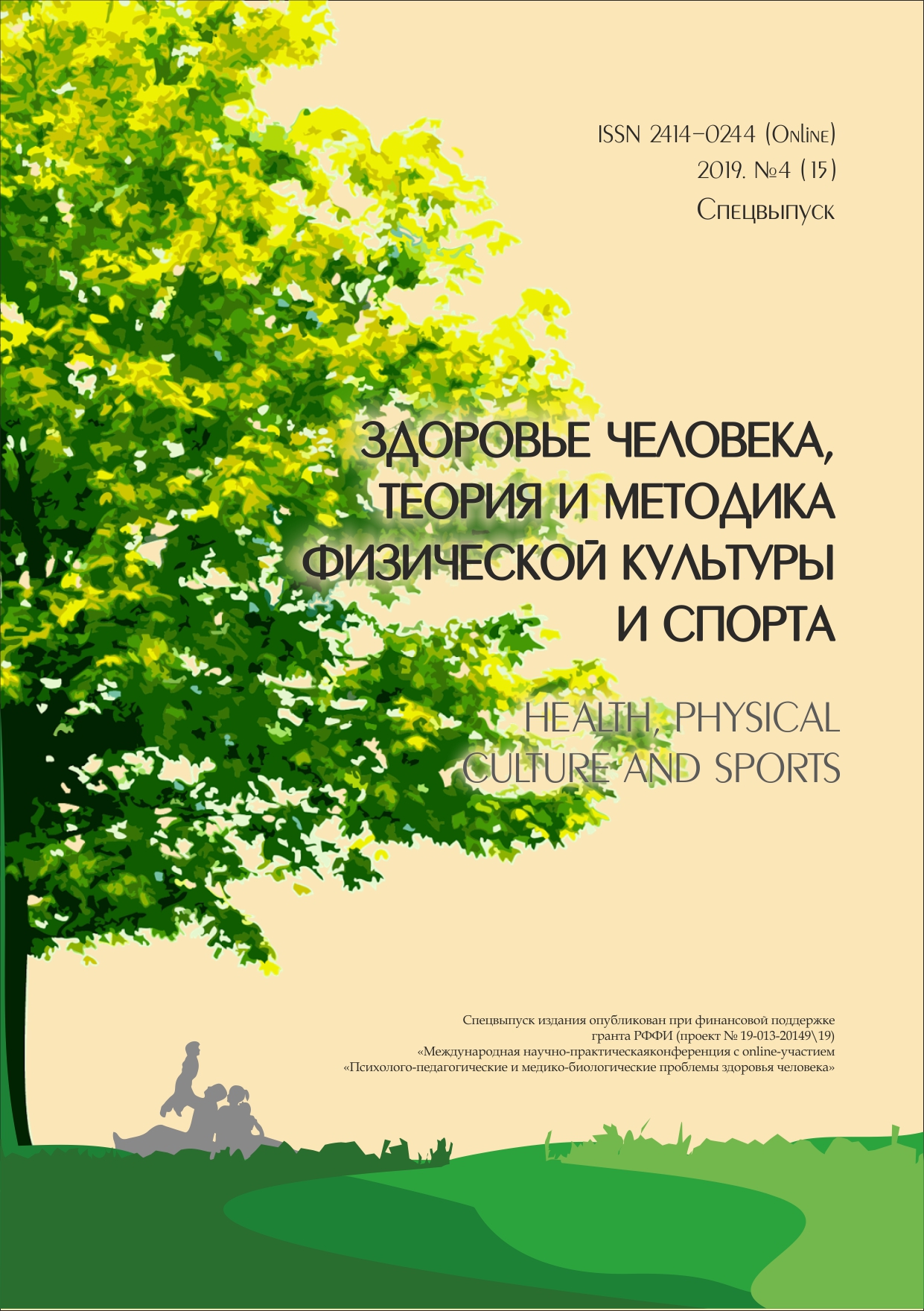INFLUENCE OF DURATION OF SLEEP ON ANTHROPOMETRIC CHARACTERISTICS OF STUDENTS OF SPORTS UNIVERSITY OF CHELYABINSK
Abstract
The article deals with the influence of sleep duration on the human body massindex. For students of sports University, this topic is relevant, as well-composed and brought to thesystematic mode of the day plays a very important role in achieving the desired result and combiningthe sports and training process with training at the University, leading an active student life. As arule, students do not observe the correct sleep and wakefulness, which is why they are at risk for suchdisorders and diseases as obesity, diabetes, high blood pressure, heart palpitations, apnea, hypopnea,low immunity and life support systems. The study used the technique of somatometry to obtain dataon the height, weight of students and the calculation of body mass index. Also, a somnological surveywas conducted to understand how much each student spends time on a daily sleep. Interpreting thedata of the body mass index, it was determined that some students have a body mass deficit (10 %)and in this regard, anemia, reduced immune system function, difficulty in performing physical workare possible. The bulk of students (62 %) have a normal body mass index. But 28 % are at the stage ofpre-obesity or obesity, the main factors of which are the lack of a formed day regimen, insufficient sleep, improper eating behavior. Studying somnological indicators of students it can be observed thatthe majority of respondents have either excess sleep (56 %) or lack of sleep, which is fully interrelatedwith the indicators of body mass index, as analyzing the literature on this topic, researchers prove thatpartial or complete deprivation of sleep significantly affects the weight of the human body weakeningits functional systems, causing hormonal imbalance, disrupting the metabolic rate.
Downloads
References
Балучи Р. Физическая работоспособность спортсменов с различными соматопсихологическими особенностями: автореф. дис. … канд. пед. наук. М.: РГУФК, 2010. С. 25.
Бумарскова Н. Н. Сомнологическое исследование студентов университета // Вестник МГСУ. 2010. № 4. С. 356–358.
Бумарскова Н. Н., Калинкин А. Л. Изучение сна студентов-спортсменов // Вестник спортивной науки. 2010. № 4. С. 30–34.
Бумарскова Н. Н. Нарушение сна у студентов и его коррекция. М., 2014. С. 25–34.
Быков Е. В., Макунина О. А., Коломиец О. И., Коваленко А. Н. Организация мониторинга состояния здоровья студентов в Уральском государственном университете физической культуры // Научно-спортивный вестник Урала и Сибири. 2017. № 1 (13). С. 3–9.
Гуляева С. С. Физическая культура, спорт, наука и образование // Материалы I Всероссийской научной конференции с международным участием. 2017. Т. I.
Диогенова К. С., Звягина Е. В. Влияние факторов режима дня на здоровье студентов, занимающихся спортом // Здоровье человека, теория и методика физической культуры и спорта. 2018. № 4. С. 37–48. [Электронный ресурс]. URL: http://journal.asu.ru/zosh/article/view/4748 (дата обращения: 29.09.2018).
Жаринов Н. М., Жаринова Е. Н. Личностные особенности студентов разных уровней спортивной успешности // Здоровьесберегающие технологии работников АПК залог продовольственной безопасности России. 2017. С. 160–164.
Макунина О. А. Функциональное состояние нервной системы студентов-спортсменов в зависимости от организации режима дня // Здоровье человека, теория и методика физической культуры и спорта. 2017. № 2. С. 112–129. [Электронный ресурс]. URL: http://journal.asu.ru/index.php/zosh (дата обращения: 18.04.2017).
Поспелова Е. А. Правильный режим дня студентов спортсменов // Актуальные проблемы физической культуры, спорта, туризма и рекреации. 2016. С. 123–132.
Романова Е. В., Готовчикова Л. В. Мотивация молодежи к занятиям физической культурой (на примере студентов Алтайского края) // Здоровье человека, теория и методика физической культуры и спорта. 2017. № 1. С. 49–59. [Электронный ресурс]. URL: http://journal.asu.ru/zosh/article/view/1739
Фадеева М. И., Савельева Л. В., Фадеев В. В. Синдром обструктивного апноэ сна в практике врача-эндокринолога // Ожирение и метаболизм. 2010. — С. 50–57.
Харина И. Ф. Изучение синдрома дефицита внимания у детей и подростков в образовательном процессе вуза физической культуры как возможность в повышении конкурентоспособности выпускников // Система менеджмента качества в вузе: здоровье, образованность, конкурентоспособность. 2016. С. 125–130.
Центерадзе С. Л., Полуэктов М. Г. Влияние нарушений сна на здоровье и возможности их коррекции // Медицинский совет. 2018. № 18. С. 28–35.
Seiko Miyata, Akiko Noda Delayed sleep/wake rhythm and excessive daytime sleepiness correlate with decreased daytime brain activity during cognitive task in university students. Journal Biological Rhythm Research 2019. Vol. 50. 171–179 P.
An author should not normally publish manuscripts describing essentially the same research in multiple journals or publication venues. Such redundant publication is generally considered to constitute unethical publishing behavior, and if discovered may result in a manuscript under consideration being rejected, or a published article being retracted.
Authors of manuscripts reporting on original research should present an accurate account of the work performed, accompanied by an objective discussion of its significance. Underlying data should be represented accurately in the manuscript. The manuscript should contain sufficient detail and references to permit others to replicate the work. The fabrication of results and the making of fraudulent or knowingly inaccurate statements constitute unethical behavior and may be cause for rejection or retraction of a manuscript or published article.





